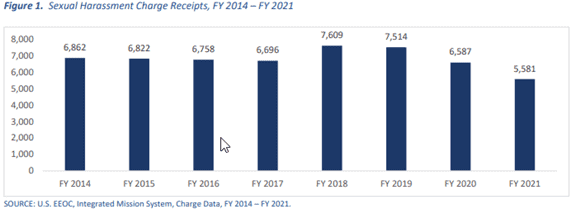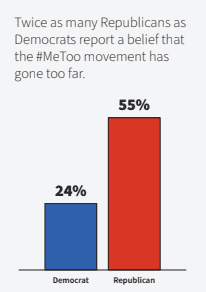In October 2017, a simple viral hashtag—#MeToo—set into motion a movement that would amplify and expose the widespread prevalence of sexual misconduct and harassment in the workplace. This movement brought forth greater awareness and attention to systemic issues in the workplace and aimed to hold known perpetrators of sexual misconduct and harassment accountable.
Five years later, following a global pandemic and increasingly divisive political environment, has the #MeToo movement significantly impacted society?
According to the EEOC, allegations of sexual harassment filings increased to its highest levels in 2018 and 2019, indicating that the movement had given rise to more victims coming forward. However, come 2020, the number of filings decreased by 12% from the previous year and dipped even further in 2021 to an eight-year low.

What’s behind this decline, and has the #MeToo trend faded?
The predominant explanation for the decline in sexual harassment claims relates to the onset of the COVID-19 pandemic in late 2019 and its impact on in-person office work. More people began working from home, which gave them fewer opportunities to be near one another, therefore, less chance for inappropriate behavior. Additionally, the pandemic dominated people’s attention, given the severity of the global health crisis and its implications on people’s lives.
Nevertheless, allegations of sexual misconduct and harassment continue across industries and sectors.
Industries with the highest rates of sexual harassment claims have typically been service-oriented or low-wage businesses like hospitality, food services, manufacturing, and retail. However, recent studies show increasing claims in industries involving emerging technologies. In fact, according to Women Who Tech, over 40% of women working in tech experienced sexual harassment. Sadly, fewer of those women reported the harassment to leadership, citing a lack of confidence that the company would handle the matter appropriately.
The military is another sector seeing an increase in sexual misconduct claims. In August, the US military reported sexual assaults increased by 13%, particularly noting increases in the Army and Navy.
Allegations of sexual misconduct and harassment will likely persist, but many viewpoints regarding #MeToo claims have evolved.
A noticeable shift in public sentiment about the movement has emerged over the past few years, mainly driven by an increasingly divisive political environment. According to a study conducted by the DOAR Research Center in 2020, more than half of Republicans and twice as many than Democrats report a belief that the #MeToo movement has gone too far. This notable divergence in attitude has increasingly put the credibility of claims up for political debate. Adding fuel to that fire are high-profile matters involving sexual assault that have cast doubt around the believability of women filing claims (i.e., the infamous Depp v. Heard defamation case).

Moreover, #MeToo once represented a rallying call for women who have primarily been the victims of sexual misconduct and harassment. Today, the hashtag signifies to some a movement that explicitly targets men for any untoward action and excludes them from being victims of sexual misconduct and harassment themselves. So much so that an iteration of the hashtag—#MenToo—has cropped up.
With this in mind, companies should focus on three main areas—crisis management, internal investigations, and workplace management—to mitigate risks as more employees return to the office.
Legal counsel looking to protect organizations from unnecessary liability against sexual misconduct and harassment allegations need to be proactive about how to address potential claims. After all, such allegations can significantly impact businesses both monetarily and from a public relations standpoint.
To safeguard organizations, counsel should consult with highly credentialled experts in areas concerning HR policies and procedures, organizational psychology, organizational tolerance for sexual harassment (OTSH), and workplace violence to examine the adequacy of programs and company practices. These same types of experts, as well as emotional damages and public relations and reputational harm experts, can also support companies in litigation.
Additionally, the presence of being neutral and taking an objective approach is paramount to maintaining a company’s good reputation, particularly in society today. Working with an experienced independent investigator who can lead and conduct impartial, thorough, and discreet investigations will ensure that you have put forth the company’s best intentions for a successful outcome.
No matter the issue, WIT represents experts who are esteemed academics, industry insiders, and subject area specialists who can address a wide range of issues relating to sexual misconduct and harassment and have experience working on both civil and criminal matters.




